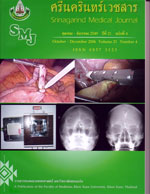Efficacy of Capecitabine in Patients with Advanced Cholangiocarcinoma
Abstract
Background: Cholangiocarcinoma is the most common malignancy in North-Eastern Thailand. While surgery is the only curative method in patients with early stage disease, chemotherapy is rarely curative in advanced patients. 5-FU based combinations are commonly used, resulting in response rates of 20-30 %. Capecitabine is an oral fluoropyrimidine that generates 5-FU in the tumor site, is highly active and well tolerated in patients with gastrointestinal cancers. Therefore we evaluated the efficacy and safety of Capecitabine as first line therapy in patients with advanced cholangiocarcinoma.
Methods: Our study was an assign stepping evaluation. In the first step 12 patients received six cycles of Capecitabine 1250 mg-m2 twice daily on days 1st -14th , every 3 weeks. The primary endpoint was overall response rate (evaluated after the 3rd and 6th cycles of Capecitabine); secondary endpoints were time to progression (TTP) and overall survival (OS). Patients with partial response (PR) or stable disease (SD) after 3 cycles received 6 cycles of treatment. Patients are to be enrolled in the second step if there is at least one response in the first 12 patients.
Results: Of the 12 patients enrolled in the first step, 9 completed 3 cycles of Capecitabine. Reasons for not completing were progressive disease (PD) after 1 and 2 cycles (n=2) and lost follow up after 1 cycle (n=1). Intention to treat analysis after 3 cycles of Capecitabine showed 2 PR (17%) and 3 SD (25%). One patient with initial PR still has a PR after completing 6 cycles of therapy. Median TTP is 4.4 months (95% CI, 1.5-7.3). Median survival has not yet been reached. Stomatitis was the most common adverse event reported (58%, 7 of 12) and 2 patients (17%) developed grade ¾ adverse events (diarrhea, hand-foot syndrome, skin cutaneous ulceration and stomatitis). All adverse events were manageable and resolved after Capecitabine dose reduction. There were 5 deaths considered due to PD and 7 patients were still alive at the time of analysis.
Conclusion: Capecitabine appears to be well tolerated and has modest efficacy in patients with inoperable cholangiocarcinoma, which is highly resistant to chemotherapy. Further investigation with larger numbers of patients is warranted to confirm the benefit of Capecitabine.
Keywords : Capecitabine , cholangiocarcinoma , advanced




